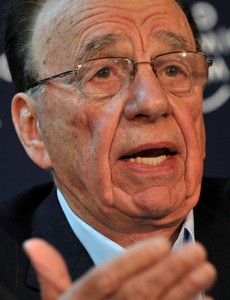“Murdoch Veterans Portray a Fully Engaged Boss,” according to The New York Times front page headline.
The New York Times writes yesterday: “He may have come across at the hearing as vague, detached and unfocused — as an old man who was at times not quite all there…
“But Mr. Murdoch has never been a disengaged boss, especially from his newspapers,” the paper reports.
But still…
Who didn’t tune into the coverage of the News Corp.’s hacking scandal without noting the contrast between the octogenarian chairman, Rupert Murdoch, and his thirty-something son, James? As our blogger noted here, it brought to the light the question of aging in the workplace.
He’s the seventh-oldest CEO of a public company with a market capitalization of at least $500 million, according to data compiled by Forbes. Among the six men older than he in that position — and they are all men — none runs a firm with a cap above $11 billion; News Corp.’s is around $40 billion. There are the 24 men age 75 and older who are CEOs of public companies with market capitalizations of at least $500 million.
There are also those who serve as chairman–Viacom‘s Sumner Redstone is 88, and Si Newhouse of Advance Communications is 83.
Losing your mental edge can be reality as you head into your 70s. But not always, and probably not in the case of Murdoch. My colleague Carolyn Rosenblatt, notes that one should be careful about suggesting “that age, itself, causes cognitive decline.”
I, like Rosenblatt, have crossed paths with more than a few 70-plus workers, who are sharp as tacks, as the expression goes, and not to be ignored in the workplace. In fact, their experience and knowledge is priceless in many instances. They can navigate tricky challenges that can fluster a younger colleague.
So it is important to be careful when equating someone’s age with their mental acuity. Looks can be deceiving.
Frankly, this works both ways. A young person can often be written off as naive, or an easy pushover in a negotiation. As a twenty-something reporter for Forbes, more than one CEO was surprised when my published story would appear, and their rosy tale had been properly put in context. I wasn’t as fresh-faced and innocent as I looked.
That said, our odds of developing dementia are almost 50% by the time we reach the age of 85, according to the Alzheimer’s Association. I know personally, when my dad edged into his 80s, Alzheimer’s disease began to rob him of his mental capacity, and he could never have kept working. He died at 88.
So what does all this mean for those of us, like Murdoch, who might find ourselves working into our 80s?
I reported here, that you need to plan to work into your 80s, according to a study, “Retirement Income Adequacy, The Impact of Deferring Retirement Age,” released by the nonpartisan Employee Benefit Research Institute (EBRI) in June. The research also shows that even if a worker delays his or her retirement age into their 80s, there is still a chance the household will be “at risk” of running short of money in retirement.
The truth is dementia and declining physical health for many people navigating the post-60s decades is a real concern. I get it. Most of us will need to bring in some income. But there’s no crystal ball to tell us whether we will not be able to handle it.
The best advice is hope for the best, prepare for the worst. Yes, you know where this is going. Start by running your numbers. Tap into an online retirement calculator. There are plenty available. True, the numbers are squishy. But the findings should spur you to you get a grip on your retirement saving and avoid a shortfall. See our story here.
Knuckle down and save as furiously as you can. Invest wisely. Lay the ground work for work in retirement by adding certifications, for example, or new skills you might need. Talk to a financial advisor if you need hand-holding. See our story here.
Remember Scarlett O’Hara’s lament in Gone With the Wind. “Oh, I can’t think about this now! I’ll go crazy if I do! I’ll think about it tomorrow. But I must think about it. I must think about it. What is there to do?”
As for Rupert Murdoch’s presentation at the hearing, experts in brain aging caution against deducing too much about Murdoch based on a few prolonged pauses and hazy answers.
Or as Rosenblatt concludes: “Let’s be careful about the insinuation that “old” and “cognitive decline” must go along together. Specific warning signs for cognitive decline exist. They are, to an extent, measurable with psychometric testing. In the absence of those signs, let’s assume that older means wiser.”
And being wiser means you know that a penny saved is a penny earned.




You must be logged in to post a comment.